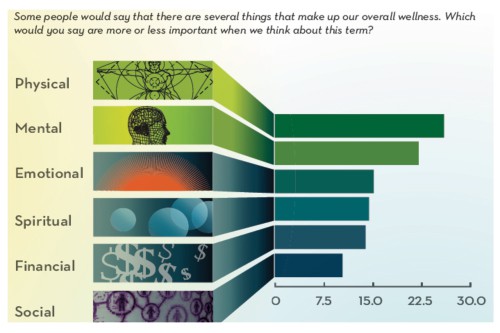
Until recently, wellbeing or wellness was one of those things, like algebra or philosophy, that didn’t exist in the real world. Now however it seems to be a buzzword at the heart of many conversations in the healthcare sector.
It is now universally recognised by leading health organisations that it is important to focus on ‘wellness’ rather than deal only with illness. So firstly, exactly what is ‘wellness’ or ‘wellbeing’?
WHO definition of wellness:
Wellness is an optimal state of health. It concerns a person’s individual health physically, mentally, emotionally and spiritually and also their role in society and fulfilling expectations in their family, community, place of worship, workplace and environment.
US Centres for Disease Control and Prevention definition:
Well-being integrates mental health (mind) and physical health (body) resulting in more holistic approaches to disease prevention and health.
Our own McCann Worldgroup global study ‘The truth about Wellness’ was also able to quantify this (see below).

Source: McCann ‘Truth about Wellness’ study 2013
So clearly we are now able to dimensionalise wellbeing/wellness. But what’s driving this?
Firstly, a changing health landscape: A WHO report states that non-communicable diseases kill more than 36 million people each year (recorded markets, with nearly 80% in low to middle income countries)
CV disease: 17.6m; cancer: 7.6m; respiratory: 4.2m; diabetes: 1.3m.
The prevalence of risk factors to which global deaths attributed; high blood pressure: 16.5%; tobacco use: 9%; raised blood glucose: 6%; physical inactivity: 6%; specific overweight/obesity: 5%.
The study found that around 37% of premature deaths in the US could be attributed to modifiable health behaviours: smoking was the leading cause, followed by poor diet and physical inactivity, then alcohol consumption. The authors commented that the rates of premature deaths due to poor diet and lack of exercise could soon overtake those attributable to tobacco use.
Secondly, the global focus on improving health outcomes.
And thirdly, the rapid rise of patient empowerment, which has put the patient at the centre of an increasingly complex circle of influence (see above), due in large part, to the growth and accessibility of online health information and the advent of personal health monitoring.

So how can pharma capitalise on this?
Overall pharma has yet to fully embrace the potential opportunities for the convergence of HCP and patient apps and the biometric data, tracking and support programmes that can be delivered.
Apple, Samsung, Google and other key players are open and welcoming to pharma companies that want to genuinely partner and move forward together. At the moment, pharma seems to be gingerly dipping its toe in the water but not making any deep financial or resource commitments.
Who is going to make the big dive in? Clearly there are hurdles – privacy laws, hurdles around data protection and data sharing, also current lack of standardised data and interoperability between platforms, devices and apps.
However, for those that do see the future and want to cut through the current clutter of variable user experiences, then I believe the opportunity is there. And then healthcare can really get personal.




